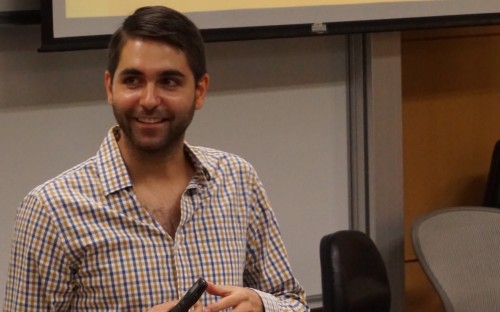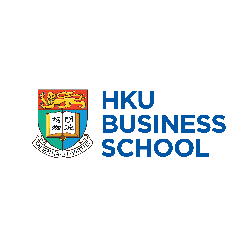Alex Staniloff joined QFPay as an equity investor after an MBA at the University of Hong Kong. The Chinese fintech firm has processed almost $100 billion in transactions to date
“I didn’t know what I was going to do in Canada. I started reaching out to a few investment banks; I would have just done the same cookie-cutter thing. Around that time, I wanted to try something new.”Alex Staniloff, born in Calgary, Western Canada, decided to get out of his hometown after studying business and finance at university. He moved to Asia, taking up an internship at a real estate company in Hong Kong. He soon fell in love with life in the East.
Settling into life in Hong Kong, he set up CHINO—a modern Asian-Mexican fusion restaurant—with an ex-executive chef from Nobu. Alex helped him on the business side.
Alex also started his own import-export company, supplying the Canadian hotel and home industry with furniture from southern China.
Now, after completing a full-time MBA at the (HKU), he’s joined groundbreaking mobile payments startup QFPay as an equity investor, driving the fintech firm’s global expansion.
QFPay serves over one million merchants in China, providing point-of-sale terminals that allow e-payments to be taken from smart devices; mobile payment services like Apple Pay and WeChat Pay in China. It’s processed over 60 billion RMB ($95 billion) in transactions to date.
Throughout his career, Alex has always had an MBA on his mind. Based in Hong Kong, he saw HKU’s 14-month, full-time MBA—ranked first in Asia for eight consecutive years by the Economist—as the perfect MBA destination; somewhere he could build his network and bolster his management skillset.
“I felt the brand name of HKU was strong internationally,” Alex explains. “I went to an MBA fair and the first time I met Sachin Tipnis—executive director of MBA programs at HKU and his team—they were incredibly warm and receptive.
“Just the way the HKU MBA team showed they cared about their students made choosing the a no-brainer for me.”
What stood out most for Alex was the HKU MBA’s Business Lab elective, which takes students through every stage of the startup process. Recent events have seen HKU Business Lab students collaborate with students from other top-ranked business schools in Hong Kong and the UK, exploring user experience (UX) design and integrating sustainability into early-stage startup projects.
During his MBA, Alex was part of the Business Lab’s winning team, working with a multinational group—from the UK, US, and India—to develop an innovative, Origami-inspired food packaging startup, designed to reduce food packaging waste Hong Kong.
“That was the best learning experience we had during the MBA,” he says. “Collaborating with a bunch of people from different backgrounds; constantly iterating and changing our idea; it really felt like a true startup scenario.”
Business Lab aside, Alex’s entrepreneurship classes with Dr. Yanfeng Zheng stood out. “He basically sat on a desk in front of us and we had amazing, open discussions for six hours straight,” he beams.
Through the MBA’s 14-month format—including a month in Beijing and Alex’s exchange semester at Fudan University in Shanghai—Alex was able to meet students from all over the world. “The real benefit came from the relationships I built and the confidence I gained to work through different business problems with different people,” he explains.
During the MBA, Alex’s goals changed. His two businesses pretty much ran themselves. At the , he started reaching out to contacts in the venture capital (VC) space in Hong Kong—that’s how he came to join QFPay
Now, based out of Hong Kong, he’s working to develop the business across Southeast Asia. “It’s an exciting space,” he says, “and I’m going to be expanding this business, for sure.”
Student Reviews
The University of Hong Kong (HKU) - MBA Programmes HKU Business School
Academic
Very good academic, caes course amazing, ccs are all amazing, professors are excellent, the architecture and infrastructure is splendid, people here are awesome, made some really nice friends, and teachers support us
Diversified culture
I highly recommend The University of Hong Kong to students all around the world because of their diversified culture, teaching standards, and the people which make the learning experience better every day.
A place where you best understand local and international cultures
With plenty of experiences available, HKU provides a plenty of experience for me to explore our own and other countries culture. She has excellent teaching and research staffs in the Department of Ecology and Biodiversity. Time allocate to students are considered sufficient and staffs are ready to reach anytime.
Besides academic, she has various subsidised programmes that allow students to explore. This credit should be given to GenEd (general education) Office to provide different interesting programmes. These ranged from guest speaker giving talks on China-Hong Kong relationship; Contemporary art in Asia; or holding mini forum on geopolitics. Most, if not all, of which are free of charge!
Life at HKU
Pursued the SHS degree at HKU, academic and clinical staff members were very devoted and passionate. The academic program is under constant reviews, staff members are open minded and willing to modify the program with regards to students' opinions. Career prospect is good. Uni life is fruitful, many different activities for students to choose. Great facilities supporting learning.
Student Life in HKU
As an Accounting and Finance year3 undergrad student in HKU, the university provides lots of opportunities for me to learn and explore my interests.
You could join a wide variety of activities, like being an committee member of societies and joining hall activities. As for me, I chose to join the winter exchange programme, be a committee member, and did volunteering servic and had latrine construction and volunteer teaching in Ghana, Africa. I also organized lots of activities for societies and had lots of meetings with company representatives. As for school work, it is okay normally but definitely u got a lot busier during November and April. You got a lot more free time compared to CUHK and HKUST. And of course, this is considered as the most ‘international’ uni in HK in a way that I could make friends coming from different countries.
Just wanna add, HKU has a good location for foodie as its near Central, Causeway Bay and Tsim Sha Tsui. For those who love night lifes dont miss this. I didnt speak of anything i dislike coz there isnt anything i dislike much, but if I do have to say, it is the hall life of many local students, such as having cheers at night and never sleeps that may disturb others.
Academics
I think it’s a great university that gives you a lot of opportunities in terms of academics as well as extracurricular activities. The education system is fairly westernized and the professors are good for the most part.
International, stratified and political
Adequate resources and very convenient campus with sufficient channels to expand your social and professional circle. Also politically active, and perhaps too biasedly so. Its law school is firmly established, with the longest history in Hong Kong. Practical and professional training, with a constant atmosphere of anxiety and competition that encourages a relatively focused and narrow vision of career outlook. Good range of extra curricular activities available.
Life in HKU
HKU provides students with lots of opportunities in multidisciplinary researches and experiences. This encourages students to widen their horizons and prepare for the future. The programme I attended organised both local and oversea field trips that allowed me to have the first hand experiences of relative aspects. It was very useful for my later career.
BSocSc
I am a graduate of the BSocSc programme several years ago. I appreciate that the programme provided a flexible choice of majors and minors. Even I was admitted into social sciences programme, I could explore various streams of studies in and out of the social sciences faculty, including global studies, human resources, politics, science and music. I did a double major in psychology and sociology. Among all learning experiences in lectures, tutorials, field trips…, I would say the internship experience was one of the most memorable part of my university life. The faculty offers a credit-bearing internship programme in which students can go to various NGOs to work on social issues, ranging from poverty, education to adjustment of ethnic minorities. Students can be placed locally or overseas, depending on placement quota, their personal preference and past experience. I went to a social service agency that serves adults who are intellectually challenged and have autism spectrum disorder. It was an eye-opening experience in observing how different professionals work together to provide training for those people and reflecting on how psychological knowledge could come into play. I was also able to gain some hands-on experience in leading an activity.
There are more and more internship opportunities for university students. It is just another way to gain practical experience apart from applying for interns in government agencies or business companies, especially in organisations that would not openly recruit interns but only work with tertiary institutions.
It should be noted that for some majors/courses, there are really a lot of people studying. When I was an undergraduate back then, we often expected a lecture with 100+ students and a tutorial with nearly 20 students. If you favour close student-teacher interaction in small classes, you may look into the enrolment of particular courses.







